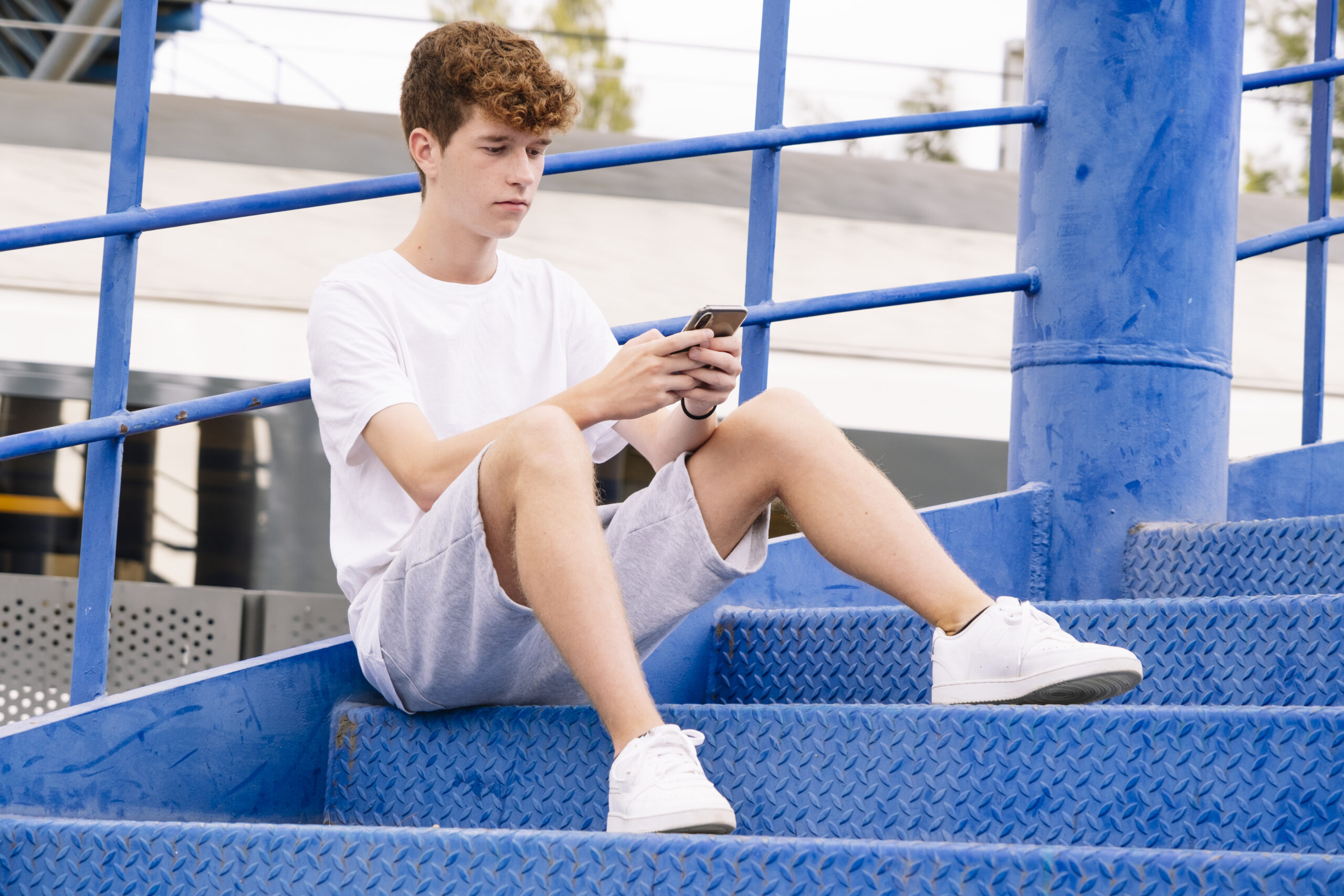Throughout my years counseling teenagers, I’ve witnessed firsthand how social media has fundamentally transformed the adolescent experience. What began as platforms for connection and creativity has evolved into complex digital ecosystems that significantly impact teen mental health in ways we’re still understanding. As someone who works with student athletes at Penn State and teens across diverse settings, I see both the benefits and risks that social media presents for developing minds. The challenge for parents isn’t necessarily to eliminate social media from their teen’s life, but rather to understand its impact and help their teenagers develop healthy relationships with these powerful platforms.
How Social Media Affects the Developing Teen Brain
Understanding social media’s impact begins with recognizing how the teenage brain processes digital interactions differently than adult brains:
Dopamine and reward systems: Social media platforms are designed to trigger dopamine release through likes, comments, and shares. For teenagers, whose reward systems are still developing, this can create particularly strong responses to social validation or disappointment when posts don’t receive expected engagement.
Sleep and attention impacts: The blue light from screens interferes with natural sleep patterns, which are already disrupted during adolescence. Additionally, the constant stream of information and notifications can fragment attention spans and make it difficult for teens to focus on single tasks for extended periods.
Identity formation interference: Adolescence is a critical period for identity development. Social media can complicate this process by providing external metrics for self-worth and creating pressure to present a curated version of themselves rather than exploring authentic identity.
These neurological impacts aren’t necessarily permanent, but they do affect how teenagers process emotions, relationships, and self-concept during crucial developmental years.
The Double-Edged Nature of Digital Connection
Social media offers both significant benefits and serious risks for teen mental health:
Positive aspects include:
- Connection with friends and family during limited in-person interaction
- Access to educational content and creative inspiration
- Opportunities to find communities based on shared interests
- Platforms for creative expression and skill development
- Resources for mental health support and information
Concerning impacts include:
- Increased rates of anxiety and depression linked to heavy use
- Cyberbullying and online harassment experiences
- Sleep disruption from late-night scrolling
- Comparison-based self-esteem issues
- Exposure to inappropriate content or harmful challenges
The key is helping teenagers maximize benefits while developing strategies to minimize risks. This requires ongoing conversation and guidance rather than blanket restrictions. These restrictions often prove ineffective for teen mental health.
Recognizing Social Media-Related Mental Health Concerns
Parents should watch for specific signs that social media use may be negatively impacting their teen’s mental health:
Mood changes related to usage: Noticeable mood shifts after social media use, anxiety when unable to check platforms, excessive worry about online interactions or posts, and emotional distress related to social media drama or conflicts.
Sleep and academic impacts: Staying up late scrolling through feeds, hiding phone use during nighttime hours, declining academic performance related to social media distraction, and difficulty focusing on offline activities or conversations.
Social functioning changes: Withdrawing from in-person social activities in favor of online interaction, conflict with family members about social media use, loss of interest in hobbies or activities not related to social media, and preoccupation with online image or follower counts.
Physical symptoms: Headaches or eye strain from excessive screen time, changes in appetite related to social media comparison, and increased physical tension or restlessness when away from devices.
These warning signs become particularly concerning when they persist over time and significantly impact your teen’s daily functioning or well-being.
Understanding Platform-Specific Risks
Different social media platforms present unique mental health challenges for teenagers:
Image-focused platforms like Instagram and Snapchat can intensify body image concerns and comparison issues, particularly for teens already struggling with self-esteem or eating disorders.
Video platforms like TikTok can expose teens to viral challenges that may be dangerous, as well as algorithm-driven content that can reinforce negative thinking patterns or problematic behaviors.
Communication platforms like Snapchat and direct messaging features can facilitate cyberbullying or inappropriate contact from strangers, while also creating pressure to maintain constant communication with peers.
Anonymous platforms can provide spaces for authentic expression but may also expose teens to harmful content or enable cruel behavior without accountability.
Understanding these platform-specific risks helps parents engage in more informed conversations with their teenagers about social media safety and mental health.
Strategies for Healthy Social Media Use
Rather than attempting to eliminate social media entirely, families can work together to establish healthy digital habits:
Create family media agreements: Develop clear guidelines about when, where, and how social media can be used, establish phone-free zones and times (such as during meals or before bedtime), discuss appropriate sharing and privacy settings, and create consequences for violating agreed-upon boundaries.
Encourage critical thinking: Help teens analyze the content they consume and consider its impact on their mood and self-perception, discuss how social media algorithms work and why certain content appears in their feeds, teach them to recognize manipulated or unrealistic images, and encourage them to curate their feeds by unfollowing accounts that consistently make them feel worse about themselves.
Model healthy usage: Demonstrate balanced social media use in your own life, show how to handle negative online interactions appropriately, discuss your own experiences with social comparison or online stress, and prioritize in-person conversation and activities in family life.
Promote offline activities: Encourage hobbies and interests that don’t involve screens, support in-person social activities and friendships, ensure regular physical activity and outdoor time, and create opportunities for face-to-face family bonding.
When Social Media Use Becomes Problematic
Professional support may be needed when social media use significantly interferes with:
- Sleep patterns and daily functioning
- Academic performance or school attendance
- In-person relationships and social skills
- Mental health symptoms like anxiety or depression
- Family relationships and household harmony
Additionally, if your teen experiences cyberbullying, encounters inappropriate content, or shows signs of social media addiction, professional guidance can help address these concerns effectively.
Building Digital Resilience
The goal isn’t to shield teenagers from all digital challenges but to help them develop resilience and healthy coping strategies:
Emotional regulation skills: Teaching teens to recognize how social media affects their emotions and developing strategies for managing negative feelings that arise from online interactions.
Healthy skepticism: Encouraging critical evaluation of online content and helping teens understand that social media presents curated versions of reality rather than authentic representations of others’ lives.
Boundary setting: Supporting teens in learning to set their own limits around social media use and recognizing when they need breaks from particular platforms or online activities.
Real-world connection: Emphasizing the importance of in-person relationships and offline activities that contribute to identity development and emotional wellbeing.
Moving Forward Together
Social media isn’t inherently good or bad for teen mental health—its impact depends largely on how it’s used and the support systems surrounding its use. By staying informed, maintaining open communication, and seeking professional help when needed, families can navigate the digital landscape while protecting and promoting teen mental health.
Remember that social media platforms and their impacts continue evolving rapidly. What matters most is maintaining ongoing dialogue with your teenager about their online experiences and being prepared to adjust strategies as new challenges and opportunities emerge.
Rachel Moyer, M. Ed, MS, LPC, CAADC is a Licensed Professional Counselor specializing in teen mental health and digital wellness at EPIC Counseling Solutions in Camp Hill, PA. With experience supporting young people through the challenges of the digital age, Rachel helps families develop healthy relationships with technology while maintaining mental well-being. To learn more or schedule a consultation, visit https://epiccounselingsolutions.com/teen-counseling-services/ or call 717-966-6847.






